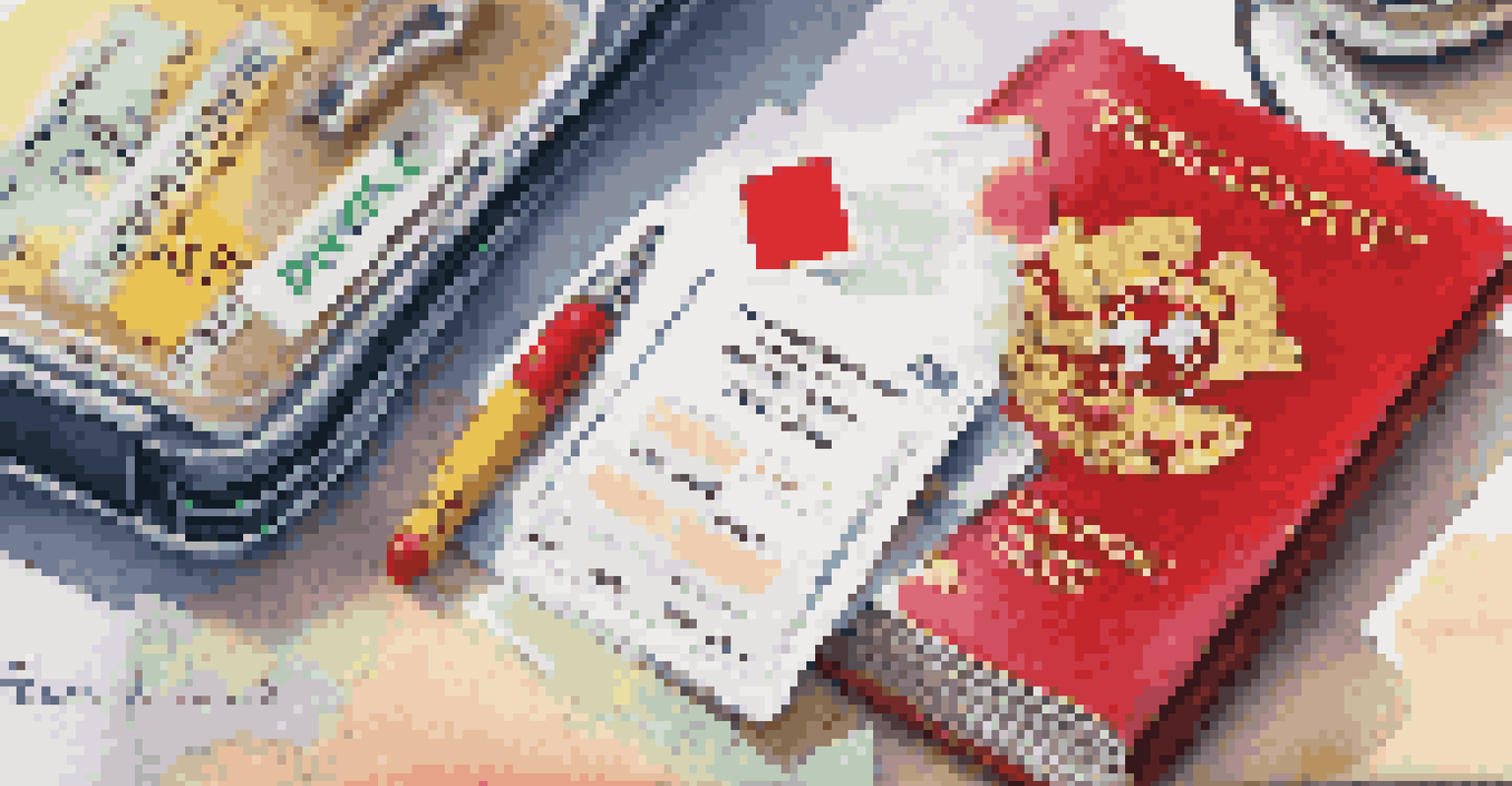Preparing a Travel Itinerary for Emergencies

Understanding the Importance of Emergency Preparedness
When we think of travel, we often envision adventure and relaxation, but emergencies can strike anytime. Being prepared means you can respond swiftly, reducing stress and ensuring safety. A well-crafted itinerary provides not just a plan for fun, but also a roadmap for navigating unexpected situations.
By failing to prepare, you are preparing to fail.
Emergencies can range from minor hiccups, like a missed flight, to serious issues, such as natural disasters or medical emergencies. By acknowledging these possibilities, you can create an itinerary that incorporates safety measures alongside your travel plans. Imagine being able to access critical information quickly when the unexpected happens.
Ultimately, the goal is to travel with peace of mind. Knowing you have a solid plan in place allows you to enjoy your journey without the weight of uncertainty. It's all about balance: excitement for adventure mixed with a healthy dose of preparedness.
Gathering Essential Emergency Contacts
One of the first steps in your emergency travel itinerary is compiling a list of emergency contacts. This should include local emergency services, your country's embassy, and trusted friends or family back home. Having this information easily accessible can be a lifesaver in critical moments.

Consider creating a small card with these contacts that you can carry with you. Include phone numbers, addresses, and even the contact details of your accommodation. This way, if you find yourself in a tight spot, you can quickly reach out for help without fumbling through your phone.
Emergency Preparedness is Key
Being well-prepared allows travelers to respond effectively to unexpected situations, ensuring safety and reducing stress.
Additionally, share these contact details with someone at home, so they know how to reach you or assist you if needed. It’s all about establishing a safety net that keeps you connected, even when things go sideways during your travels.
Documenting Important Travel Information
When preparing your travel itinerary, don't forget to include vital documents like passport numbers, travel insurance details, and medical information. This documentation can serve as a reference point in emergencies, ensuring that you have everything you need at your fingertips.
The best way to predict the future is to prepare for it.
Consider creating a digital folder or a physical copy of these documents. In a technology-driven world, having backups is crucial. If your phone gets lost or your laptop is damaged, you still have access to essential information.
Additionally, consider noting down any allergies or medical conditions, as this can be crucial information for healthcare providers in an emergency. A little preparation goes a long way in ensuring you're equipped to handle unforeseen circumstances.
Planning Your Transportation for Emergencies
Transportation can quickly become a challenge in emergencies, so it's vital to have a plan. Identify multiple routes to key locations, such as hospitals or embassies, in case your usual route is blocked. This foresight can save you precious time when every second counts.
Also, familiarize yourself with local transportation options. Knowing where the nearest taxi stands or public transport stations are can make a big difference. For instance, if a natural disaster occurs, having alternative transport methods can help you evacuate more efficiently.
Essential Emergency Contacts
Compiling a list of emergency contacts, including local services and your embassy, is vital for quick assistance during crises.
Lastly, consider downloading apps that provide real-time traffic updates or navigation assistance. In a crisis, technology can be your best friend, helping you adapt to changing circumstances and stay safe.
Creating a Checklist for Emergency Supplies
An effective travel itinerary should include a checklist of emergency supplies you may need. Essentials like a first aid kit, bottled water, and flashlight can prove invaluable during unexpected situations. Think of it as a safety net that you carry with you, ensuring you’re equipped for the unexpected.
Tailor your checklist to your destination and activities. For instance, if you're hiking in remote areas, include a whistle and a map. Having a complete list means you're less likely to forget critical items when packing.
Finally, review and update your checklist regularly. As your travel plans evolve, so should your supplies. This ongoing attention to detail will help you feel more confident and secure in any situation.
Understanding Local Emergency Procedures
Before you embark on your trip, take time to research the local emergency procedures of your destination. Different regions may have unique protocols for natural disasters, healthcare access, or other emergencies. Knowing what to expect can help you react more effectively.
For example, if you're traveling to an area prone to earthquakes, familiarize yourself with local safety drills and evacuation routes. This knowledge can empower you to act quickly and decisively in the face of danger.
Stay Informed with Real-Time Updates
Utilizing apps and local news sources keeps travelers informed about emergencies, enhancing their ability to react swiftly.
Moreover, consider consulting with locals or your accommodation hosts about best practices during emergencies. Their firsthand experiences can provide invaluable insights that you might not find in guidebooks.
Staying Informed with Real-Time Updates
In today’s fast-paced world, staying informed is crucial, especially when traveling. Download news apps or follow local news outlets on social media to receive real-time updates about weather, safety alerts, and other pertinent information. Being in the loop can give you a significant advantage in emergencies.
Additionally, consider setting up alerts for your travel destination. Many weather apps allow you to receive notifications about severe weather or other local emergencies. This proactive approach ensures that you’re not caught off guard.

Finally, don’t underestimate the power of community. Engaging with fellow travelers or locals can provide you with real-time insights that official sources may not cover. Building a network while you travel can enhance your overall experience and safety.